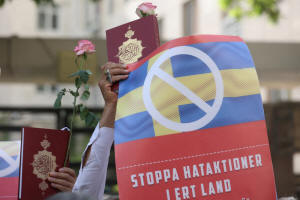|
The
resolution, introduced by Pakistan on behalf of the 57-nation
Organisation of Islamic Cooperation (OIC), calls for the U.N.
rights chief to publish a report on religious hatred and for
states to review their laws and plug gaps that may "impede the
prevention and prosecution of acts and advocacy of religious
hatred."
It was strongly opposed by the United States and the European
Union, who say it conflicts with their view on human rights and
freedom of expression. While condemning the burning of the
Koran, they argued the OIC initiative was designed to safeguard
religious symbols rather than human rights.
An Iraqi immigrant to Sweden burned the Koran outside a
Stockholm mosque last month, sparking outrage across the Muslim
world and demands by Muslim states for action.
The vote's outcome marks a major defeat for Western countries at
a time when the OIC has unprecedented clout in the council, the
only body made up of governments to protect human rights
worldwide.
Twenty-eight countries voted in favour, 12 voted against, and
seven countries abstained. Representatives of some countries
clapped after the resolution passed.
Marc Limon, director of the Geneva-based Universal Rights Group,
said the outcome showed "the West is in full retreat at the
Human Rights Council."
"They're increasingly losing support and losing the argument,"
he said.
Michele Taylor, the U.S. Permanent Representative to the U.N.
Human Rights Council, said the United States' concerns about the
initiative "were not taken seriously."
"I believe with a little more time and more open discussion, we
could have also found a way forward together on this
resolution," she said.
After the vote, Pakistan's Permanent Representative to the U.N.
in Geneva, Khalil Hasmi, accused the West of "lip service" to
their commitment to prevent religious hatred.
"The opposition of a few in the room has emanated from their
unwillingness to condemn the public desecration of the Holy
Koran or any other religious book," he said.
"They lack political, legal and moral courage to condemn this
act, and it was the minimum that the Council could have expected
from them."
(Reporting by Gabrielle Tétrault-Farber and Emma Farge; Editing
by Toby Chopra and Conor Humphries)
[© 2023 Thomson Reuters. All rights
reserved.] Copyright 2022 Reuters. All rights reserved. This material may not be published,
broadcast, rewritten or redistributed.
Thompson Reuters is solely responsible for this content.

|
|




